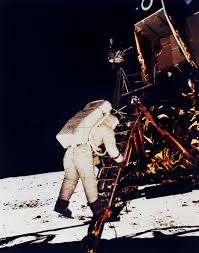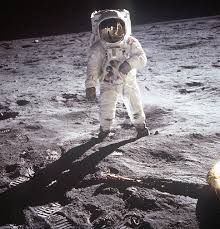.

The Apollo 11 crew portrait. Neil Armstrong,Michael Collins, and Buzz Aldrin
I remember the Apollo 11 moon landing vividly. I stayed up all night to watch it on our B&W TV in 1969 and I still have the scrapbook I made with all the newspaper and magazine cuttings. It was a defining moment for a generation. In the age of Lunar landings and Concorde, we could do anything. The world (and space) was our oyster.
You can watch it yourself on this You Tube clip or another version on the BBC News and see that moment when Neil Armstrong stepped out from the Eagle lunar module onto the lunar surface - 'the sea of tranquility' (2oth July) and spoke the immortal words:
'One small step for man one giant leap for mankind'




Now 40 years later, do we still feel the same ? Are we as optimistic? or a little more jaundiced? There have certainly been many technological advances The BBC website has a nice clip on 'What the moon landings did for us'. So many things we take for granted. But the effect of the whole space programme being 'grounded' may have done more to limit our visiion than we realise. Do people really talk as much about 'reaching for the stars' or is our vision also more 'grounded'?

The Russian cosmonaught Yuri Gagarin , the first man to orbit the earth (he has a statue in Moscow called 'Rocket Man') is supposed to have said that he looked but "I don't see any God up here." But it seems this statement is unfounded. Another myth. Rumours that Neil Armstron heard the sound of the Azan and subsequently became a Muslim are also unfounded. However James Irwin felt the power of God on his Apollo 15 moon walk and according to TIME magazine founded an evangelical organisation and tried to find Noah's Ark on Mount Ararat.
'Where there is no vision the people perish', according to Proverbs (29:18), 'but happy is he who keeps the Law'
Maybe that is where vision comes from. More from the Creator of the stars than the stars themselves.


No comments:
Post a Comment